Welcome to the Animal Models for the Social Dimensions of Health and Aging Research Network
The Research Network supports research that integrates animal models into studies of social aging. We facilitate the exchange of ideas, concepts, and data between researchers working on animal models and on humans, provide mentorship and training for new investigators, and support new projects focused on using animal models to improve human health and well-being during aging.
Follow us on all social media platforms below for new funding updates!
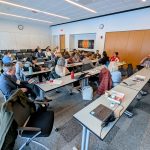
Second Network-the-networks Meeting in 2026 Is a Success!
The Research Network hosted the second Network-the-networks meeting in 2026, this one at the University of Minnesota and hosted by contact PI Alessandro Bartolomucci and co-I Kathleen Mullan Harris. Also in attendance were Advisory Board members Darren Baker and Carol Shively, who helped lead several networking sessions focused on translating animal models research to aspects of social aging in humans.
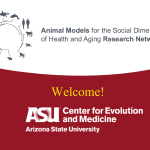
PI Noah Snyder-Mackler Hosts the First of Two Network-the-network Meetings
The Animal Models for the Social Dimensions of Health and Aging Research Network organized the first of two Network-the-networks meeting in 2026. This first meeting focused on the aim of "diversify[ing] the animal taxa used in the study of Social Determinants of Aging" at Arizona State University on January 15-16, 2026, and was hosted by Network PI Noah Snyder-Mackler and co-hosted by Network PI Jenny Tung and Advisory Board member Susan Alberts.
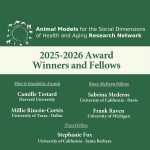
Announcing the 2025-2026 Pilot Award and McEwen Fellowship Winners
We are thrilled to announce the winners of the 2025-2026 Pilot & Feasibility awards, Bruce McEwen Fellowship, and Research Network travel fellowship! Congratulations to Pilot awardees Camille Testard (Harvard) and Millie Rincón-Cortés (UT Dallas), McEwen Fellows Sabrina Mederos (UC Davis) and Frank Raven (Michigan), and travel fellow Stephanie Fox (UC Santa Barbara! Learn more about their projects by clicking the link above.

Network Contact PI Alessandro Bartolomucci Named Editor-in-Chief
We are excited to announce that Alessandro Bartolomucci has been named Editor-in-Chief for the journal Neuroscience and BioBehavioral Reviews. Neuroscience and BioBehavioral Reviews is a peer-reviewed journal publishing reviews that integrate brain function and behavior across a range of areas including physiology, psychology, health and disease across the entire lifecourse of model organisms, and humans.

Dr. Brian Sweis Publishes Twice in Science Advances in July 2025
Dr. Brian Sweis, assistant professor at Mount Sinai, published two papers in Science Advances based on his research on the neuroeconomics of decision-making. Dr. Sweis received a Stage 2 Pilot & Feasibility award from the Research Network in 2023. Click the link above for the Bluesky announcement that links the articles!
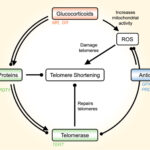
Bruce McEwen Fellow Dr. Sarah Wolf Publishes in JEZ-A
Dr. Sarah Wolf, postdoctoral research associate at The University of Edinburgh and recipient of the Bruce McEwen fellowship in 2021, recently published "Telomere-Related Gene Networks in the Ovary Shift Across Environmental Factors" in the Journal of Experimental Zoology - Part A. Click the link above to read the full text!
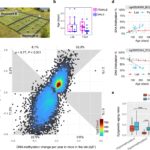
New Network Member Publication
Congratulations to Dr. Michael Sheehan and Dr. Matthew Zipple (Cornell) on their new paper in Aging Cell titled "Ecological Realism Accelerates Epigenetic Aging in Mice." Dr. Sheehan received a Stage 1 Pilot and Feasibility Project award in 2020, and Dr. Zipple received Stage 1 Pilot and Feasibility Project award in 2021 from NIA Research Network grant R24AG065172. See our Award Recipients page for more information about their projects!
2025 Catalysis Meeting
We are delighted to bring together researchers, fellows, and collaborators for this dynamic three-day event focused on "Toward a Mechanistic Understanding of Protective and Damaging Effects of Social Determinants of Health: Behavior, Social Genomics, Biomarkers, and Molecular Mechanisms." The event will take place January 23-25th in Chapel Hill, NC.

Announcing the 2024 Bruce McEwen and Travel Fellows
Congratulations to the 2024 McEwen Fellows: Nalina Aiempichitkijkarn, Zhengyi Huang, Meghan Sosnowski, Ezra Winter-Nelson and Travel Fellow: Millie Rincón-Cortés. Click on the above link to learn more about the newest fellows and their research.

Christi Gendron presents TEDxJacksonville talk
Christi Gendron, 2021 Pilot Project Awardee, presented a talk on “The Science of Lifespan — and the Impact of Your Five Senses” at TEDxJacksonville. Check out her presentation!

Jenny Tung Elected to the National Academy of Sciences
We are excited to announce that Dr. Jenny Tung has been elected to the National Academy of Sciences. Jenny is the Director of the Department of Primate Behavior and Evolution at the Max Planck Institute for Evolutionary Anthropology, Professor of Evolutionary Anthropology and Biology at Duke University, and co-Director of the Animal Models for the Social Dimensions of Health and Aging Research Network. Her research focuses on the intersection between behavior, social structure, and genomics, using captive and wild primates as model systems.
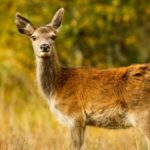
NIA Highlight Network Fellow Albery's Publication
The National Institute of Aging have highlighted McEwen Fellow Greg Albery's recent publication in Nature Ecology and Evolution. Dr. Albery and colleagues showed that as they age red deer become less social and move to increasingly isolated areas.

Evolution & Social Determinants of Health Symposium at 2022 ISEMPH
At the 2022 ISEMPH meeting, the Animal Models for the Social Dimensions of Health and Aging Research Network organized a session focused on the social determinants of health. Speakers included Adrian Jäggi, Rebecca Sear, Camille Testard, and Barbara Natterson-Horowitz with study systems ranging from hyenas to humans. Visit our News section for more information, including talk titles and abstracts.
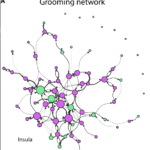
McEwen Fellow Publishes Social Network & Brain Circuitry Link
Bruce McEwen Fellow Camille Testard published a research article detailing the link between social network size and the expansion of brain circuits in a free-ranging population of rhesus macaques. This supports the idea that the social determinants of health and aging work partly through social environmental influences on the brain.
The Research Network is supported by funding from the National Institute on Aging, under award number R24AG065172